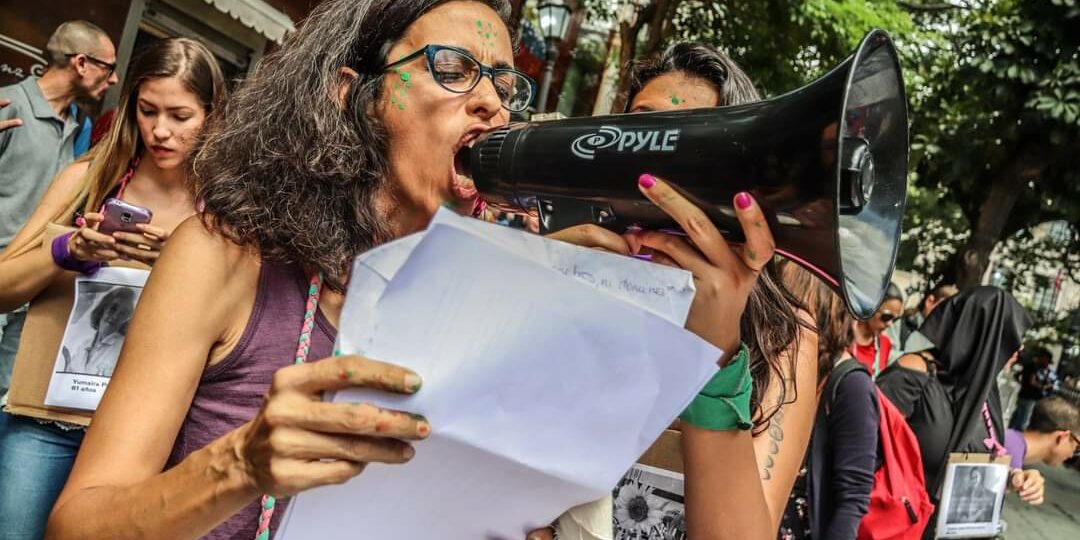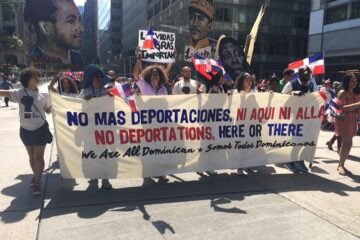Alejandra Laprea has been, since October 2023, one of the new representatives of the Americas at the World March of Women (WMW) International Committee, side by side with Norma Cacho, from Mexico, and Cony Oviedo (deputy), from Paraguay. Alejandra is a filmmaker and militant with La Araña Feminista, a network of collectives that joined the WMW in 2013.
Alejandra attended the 8th International Conference of La Via Campesina in Bogota, Colombia, between December 1st and 8th. She also attended the 6th Women’s Assembly of La Via Campesina, on December 2nd, maintaining a commitment with the joint efforts between feminism, food sovereignty, and the global transformation of the economic system. She granted the interview below to Capire on that occasion, addressing the history of the World March of Women in Venezuela, the anti-imperialist struggles in the country and the region, and the importance of building an internationalist grassroots feminism with a solid practice of forming alliances with other global grassroots movements.
Can you tell us about your political background and the formation of the World March of Women in Venezuela?
Venezuela first joined the World March of Women through the network of collectives La Araña Feminista, a network that emerged in 2010. I remember that, in 2012, in one of our meetings, when analyzing the country’s situation and the media blockade we were facing, we decided to start to coordinate with other similar organizations to break the blockade that was imposed on us. The first blockade Venezuela suffered was this: not being able to tell the world what was happening or presenting a version of what was happening that was not very close to what we were experiencing.
Nalu Faria, who was a close friend of one of La Araña’s co-founders, Alba Carosio, always said, “Alba, look, the March is doing this and that…” So when La Araña made the decision to start to join international efforts, we were invited, through this contact between Nalu and Alba, to the 9th International Meeting of the WMW in São Paulo. Aimée Benitez and I attended as delegates and took part in the methodologies by language and region. I had never been to such a huge space and with such a high level of organization. Back in Venezuela, we introduced a report and in 2014 we filed our formal request to join the National Coordinating Board of the March. Back then, our collective was active in six or eight states in Venezuela. Joining the March was a very rich experience, especially due to the exchange of information, knowledge, and wisdom, and it reached exactly the goal we had.
I remember that, at first, no one knew about Venezuela, no one knew what to think about Venezuela or the Revolution. The most “reasonable” people would stay neutral. There was also the risk that the country’s right-wing organizations could take over these spaces and continue to replicate the dominant narrative that delegitimizes the decision of the Venezuelan people. You cannot say whether the decision is good or bad—the decision is ours.
In the Americas, what can the struggles in Venezuela against imperialism teach the continent?
I think that all national coordinating boards have a lot to share in terms of knowledge about resistance, struggles, and proposals. As the people, we are obstinate and we like to smile. If there is something I would highlight in my country and in us, women—it’s our tenacity. We make a decision and we want to take it all the way. This is the commitment we have. Do we make mistakes? Yes, because revolutions don’t come with a manual, and history books and experiences cannot be adapted from one country to the other. What happens sometimes, for example, is that I look at Guatemala and I know what is going to happen to them, because it’s something I’ve been experiencing for two decades. I know what it is like to invest in one political option, play by the rules of the game, and then having to stand up for your decision every day until the end of your life.
And what can I share? I think the obstinacy, the tenacity, and the commitment we have regarding our election decisions and our decisions as a people, of wanting to change our system and our way of organizing.
Alejandra Laprea
How do you see the current dispute for the Esequibo territory?
Esequibo is part of the territory I originally come from. This is a very close issue to me, because I have experienced it over the course of my life. I know it’s difficult to understand, but this is a territorial dispute that goes back to the time when capitalistm tried to reorganize the world. The Spanish Empire came to an end and other emerging empires said, “Well, here is a territory we can’t share.” This territory is very rich in biodiversity, in fresh water. The dispute now is only focusing on the continental maritime gas platform, but the fresh water wealth there is impressive.
When you are born into a struggle, there is a need to defend yourself in face of what is unfair, against something that has more influence in an international court, because they speak English and are able to say, “Well, this piece of land is mine now.” For a few years now, the map of Venezuela has been systematically disfigured with this narrative, but Esequibo is a territory that has historically belonged to Venezuela—we share the same geography. It is part of the Pemon nation, which is an Indigenous people, and this is their true territory. It is part of our landscape.
I believe that the referendum is a reminder for the other areas of the country, which are very far away geografically. The referendum was good to remind all Venezuelans that Esequibo exists, that it is also part of Venezuela, and that we must defend it, for its biodiversity, for the people who live there, for its landscape. At some point the British hunger for territories was so big it changed the borders four hours away from the town where I was born. This offers a glimpse of how these empires see us. We were creating a nation that had its own internal conflicts, but we were reorganizing ourselves, recovering from more than 30 years of war of independence. And that was the moment they decided to take away an important share of our territory. As a Venezuelan and as a Guyanese, I must say Esequibo is ours, it is mine, it is Venezuelan land.
How do you see the role of the World March of Women in the global context? What is the strategic importance of alliances for building grassroots feminism?
The World March of Women has been a very important space to coordinate common regional efforts and actions. To think that the March is active in the five great regions of the planet—some as diverse as Asia—and that the feminist movement has a space where we can come together, look at each other and have a common discourse, to me that is extremely important. It is power accumulated for the movement and to amplify our voices and actions. This is also the importance of feminist internationalism: to amplify voices and different struggles, and to recognize the mechanisms of patriarchy and capitalism, which may have different names but are the same mechanisms of oppression. And if they are the same mechanisms of oppression, we have to think, together, about how to face them.
Alliances are extremely important for the feminist struggle. We can’t be talking about liberating half of the population only among women. We have to talk about this with everyone, of every gender. Attending a space like the Conference of La Via Campesina can create common causes, find aspects where our struggles meet together and permeate each other, identify ourselves, and start to formulate strategies and actions together—all of that is extremely powerful. Building unity among grassroots and social movements is fundamental to end the system of multiple oppressions. Oppressions don’t work separately. So why should we work separately?
___
Original language: Spanish




